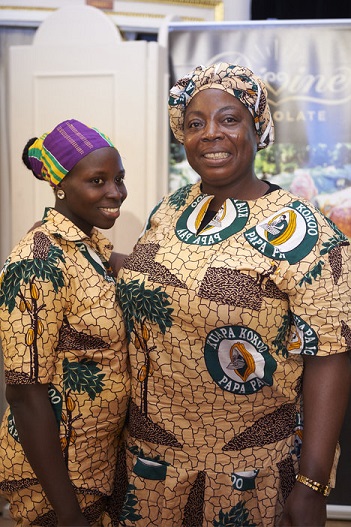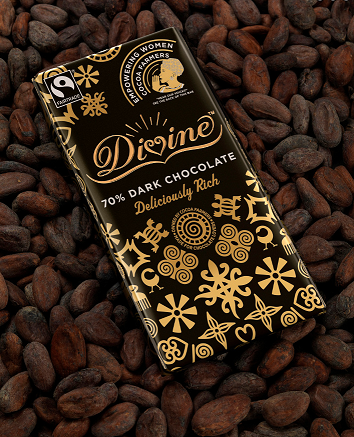Gender quotas at the Ghanaian co-operative that supplies the UK Fairtrade company have been transformative, says CEO Sophi Tranchell. FTSE companies should take note. Terry Slavin and Rebecca Ley report
Having women at the helm in the Ghanaian cocoa farming cooperative that supplies Divine Chocolate has been a crucial ingredient in the UK company's success, Divine’s CEO, Sophi Tranchell, told an audience in London last week.
Tranchell was speaking at an event to launch a report chronicling the UK company’s 20-year relationship with the Kuapa Kokoo cooperative, which owns 44% of Divine. Earlier this month the company announced a 40% increase in profits for last year, meaning it will pay a dividend to the co-op on top of the $200 a tonne Fairtrade premium it pays for cocoa beans.
Kuapa Kokoo farmers also benefit from a further 2% of Divine's turnover (over £2m to date), which is invested in programmes including farmer training and adult literacy and numeracy classes, more than doubling the impact of the Fairtrade premium.
Tranchell said the co-op, which has grown from 2000 farmers in 1993 to 85,000 today, had espoused gender equality from the start, with a rule that in a village committee of five farmers at least two had to be women.
“Due to initiatives such as introducing quotas, 35% of its membership are now women; it has had two elected women presidents, half its national executive committee are women, and women hold elected positions throughout the organisation – the sort of figures most of the FTSE 100 are still very far from achieving,” Tranchell said.
She added that western companies had a lot to learn from Kuapa Kokoo. Although there has been progress on gender equality since 2010, when 152 FTSE 250 companies had no women on their boards, today there are still 15 with no female presence. Change is happening, but not fast enough, she said. “We have to get there quicker, and I put my money on quotas.”
Kuapa Kokoo (which means “good cocoa farmer”) is unique in cocoa production. Professor Stephanie Barrientos from the University of Manchester, who helped Cadbury develop its Cocoa Life sustainability scheme, told the conference that cocoa is overwhelmingly by smallholder farmers, most of them men, and it is men who are the focus of training programmes to help them improve their crops, which have been threatened by climate change.
Women are effectively barred from access to training programmes because of illiteracy or responsibilities to their families, but it is they who have key roles in maintaining the quality of crops.
“You need to ensure women have equal access to all training, and find out what is stopping women from participating,” Tranchell said.
Linda Berchie, one of two women farmers from the Co-op Divine invited to London for Fair Trade Fortnight, told how adult literacy and numeracy classes had empowered women cocoa farmers to play a full part in the co-op. “Due to this training, we know what is happening in our business.”

Victoria Boakyewaa and Linda Berchie
Divine is publicly embracing Goal five of the Sustainable Development Goals, about gender equality, in its marketing, and has put an “empowering women cocoa farmers” logo on its bestselling 70% dark chocolate bar. “If consumers and investors are going to be a force for good they need to know what the SDGs are,” Tranchell said. “We’re taking it front-facing and hoping that others will do the same. We’re shouting about our commitment to women’s empowerment on the front of our bars.”
Tranchell also praised the Co-Op for its decision in 2000 to use Divine’s chocolate in its own-label Fair Trade chocolate, a move that tripled the small company’s turnover at the time.
By showing that Fairtrade can be affordable, taste great and be commercially successful, Co-op helped influence the whole industry, she said.
She said Co-Op’s recent announcement that it will only use 100% Fairtrade cocoa in its full range of products is another shot in the arm for the movement. Since cocoa is used in everything from cakes to the batter on some fish products, its Fairtrade cocoa sourcing will increase from 526 tonnes to 2,848 tonnes a year. “That’s an enormous commitment,” she said.
In an interview with Ethical Corporation after the event, Tranchell said companies may have to go beyond Fairtrade to a business model that allows farmers to share in ownership if they want to truly make cocoa sustainable. “The chocolate industry is enormously valuable but farmers aren’t getting their fair share of the wealth,” she said. “You have to make sure some of the wealth gets to the farmers who supply the most important ingredients.”

Not only does Kuapa Kokoo hold 44% of Divine’s shares. Two members of the cooperative sit on Divine’s board, and one of four annual board meeting is held in Ghana. She said this was more expensive than holding meetings in London, “But from the beginning we built in the cost of working with the farmers.”
Little surprise then that Divine this year received certification as a B Corp, a movement of 2,000 companies, including Ben & Jerry’s and Patagonia, that run their businesses as a force for good. “I think looking at a significantly different model of business in an important tool for addressing inequality in the world.”
Asked whether this was something that could be scaled up to the level of a big multinational company, she said: “We won’t know unless we try. Look at a company like John Lewis, which is very competitive in the UK retail market, and partly delivered and built on the fact that it is employee-owned. Employees get about 15% of their annual salary as a bonus [linked to profits] each year. They have taken a decrease in their bonus because they recognised there was a hole in their pension pot and they needed to fill it. That’s how a responsible business behaves.”
She contrasted that with the management of BHS, where the company’s collapse left a huge pension deficit. “A different model of business can be a more successful, more competitive and more nimble sort of business. By creating an ownership model that operates for the long term, you create a business that’s fit for the future.”

